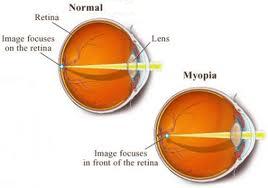
Myopia? What is this? What is short-sightedness What causes this problem? Is it progressive? What are the signs and symptoms? How can homeopathy help you? All of this and more answered, in this post and of course our doctors always there to help you. Just fill in your details in the form down below and we will answer all your questions for FREE!

1)What is Myopia?
It is a refractive eye disease. It is progressive in nature and it occurs when light entering the eye is focused incorrectly, making distant objects appear blurred mainly because of an eyeball being too long.
It is also known as near-sightedness or short-sightedness.
2)Who is affected due to Myopia?
The eye disease starts during the childhood age.
It is inherited and mainly present between the age of 8 to 12 years old.
During the teenage years, when the body grows rapidly, myopia may become worse.
This eye disease affects males and females equally.
People with a family history of nearsightedness are more likely to develop.
3)Can myopia lead to blindness?
Yes, in some cases myopia leads to blindness and it depends upon person to person according to the severity of the case. Myopia mainly causes the nearsightedness that causes a major alteration of the shape or globe of the eyes, which leads to vision loss.
4)What causes myopia?
Patient having the family history of eye disorders can develop myopia.
Sitting too close to the TV.
Using minus glasses for close up work also causes myopia.
Playing video games.
Overuse of phone.
More Working on the computer.
Reading and writing in dim light.
It can occur when the physical length of the eye is greater than the optical length.
Genetic history.
Environmental factors.
5)What is high myopia?
High myopia increases the chances of retinal detachment. The causes of retinal detachment are:
Flashing lights.
A recent onset, increase or change in your floaters.
Mostly this type of myopia is commonly present.
Pathological myopia can cause damage to the retina, choroid, vitreous, and sclera.
6)What is low myopia?
Low myopia is a mild form of myopia. Low myopia is a type of refractive error. Myopia can be divided into degrees of severity:
Low
Medium
High.
Constant blurred long-distance vision is the main symptom of low myopia.
7)What are the sign and symptoms of Myopia?
Some sign and symptoms of myopia are:
Eye strain.
Patient having trouble clearly seeing images or words on a whiteboard, movie screen or television.
A headache due to over strain.
Blurred vision looking at distant objects.
Squinting.
A child with nearsightedness.
Blinking of eyes.
Patient rubbing eyes frequently.
8)Is myopia progressive?
In some cases, this eye disease is a progressive eye disease. Progressive myopia has a genetic predisposition, and it starts in early childhood.
9)Is there a cure for myopia?
Early diagnosis of myopia is important, and curability is depended upon the person to person.
LASIK surgery Laser-assisted in-situ keratomileusis.
Use proper eye lenses.
Laser-assisted sub epithelial keratomileusis (LASEK).
Laser eye surgeries.
Eye Exercises may help
10)What are the Complications?
Some of the complications are:
Eyestrain.
Corneal ulcers and infections.
Retinal degeneration.
Glaucoma.
Some cases due to this, Parsons having reduced quality of life.
11)Can changing lifestyle help?
Regular eye checkup.
Wearing sunglasses.
Nutritious foods like green leafy vegetables, fish, fruits etc.
Eat food which containing vitamin A and carotene.
Avoiding smoking.
Do not overuse of TV, phones etc.
12)How to detect myopia?
The eye disease can be detect by:
Eye examination of the patient.
Refraction test for the correct prescription for glasses.
Measuring eye pressure.
Retinal examination.
Slit lamp examination.
Visual acuity test.
13)Can myopia lead to glaucoma?
Yes, patient with myopia may be at increased risk for the development of glaucoma.
14)Is homeopathic medicines can help in case of Myopia?
Yes, homeopathic medicines help in case of myopia. Homeopathic medicines prevent the further progression of this disease. Some of the important homeopathic medicines are as follows:
Phosphorus
Ruta Graveolens
Physostigma
Lilium Tigrinum
Euphrasia Officinalis
For more information, you can visit NIH and Wikipedia.